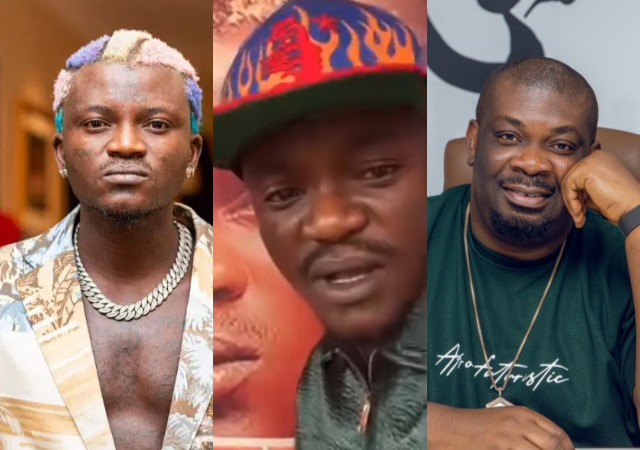In a startling turn of events that has laid bare the complex dynamics of celebrity, philanthropy, and social media in Nigeria’s vibrant entertainment landscape, controversial singer Portable has made an impassioned plea to music mogul Don Jazzy. This appeal comes in the wake of Don Jazzy’s headline-grabbing N100 million donation to activist Verydarkman’s (VDM) newly established NGO, igniting a firestorm of reactions across the Nigerian music industry and beyond.
The saga began when Verydarkman, a prominent Nigerian activist known for his outspoken commentary on social issues, announced the creation of a charity account for his Non-Governmental Organization (NGO). The initiative, aimed at providing assistance to those in need, quickly gained traction, amassing over N70 million from wealthy donors in a short period.
However, it was in the early hours of Thursday, October 17th, that the story took an unexpected turn. VDM shared his shock and disbelief upon discovering an additional N100 million in his NGO account, deposited without any prior notification. The mystery was soon solved when Don Jazzy, the founder of Mavin Records and one of Nigeria’s most influential music producers, reached out to VDM.
In his message, Don Jazzy explained that he had made the substantial donation because he believed in VDM’s cause and was confident in the activist’s commitment to transparency in fund management. This act of generosity quickly became the talk of Nigerian social media, sparking a wave of reactions from celebrities and fans alike.
As news of the donation spread like wildfire across various social media platforms, Don Jazzy’s Instagram page was soon inundated with messages. Prominent figures in the Nigerian entertainment industry, including Zlatan Ibile, Tiwa Savage, and Portable, were among those who flocked to the producer’s page, many with their own requests for financial assistance.
This influx of attention highlighted not only Don Jazzy’s influence within the industry but also the complex relationship between celebrity, wealth, and social responsibility in Nigeria’s entertainment ecosystem.
Among the voices clamoring for Don Jazzy’s attention, one stood out for its raw honesty and controversial nature. Habeeb Okikiola, better known by his stage name Portable, took to his Instagram story with a direct and unabashed appeal to the Mavin Records founder.
Known for his candid and often controversial public persona, Portable didn’t mince words in his message to Don Jazzy. The “Zazuu” hitmaker referenced a previous interview in which Don Jazzy had mentioned using Portable as a source of inspiration for his signed artists, encouraging them to boost their online presence in a manner similar to the outspoken singer.
In his plea, Portable argued that if Don Jazzy was using him as motivation for others, he should also be rewarded financially. His message, delivered in a mix of English and Nigerian Pidgin, was both a critique of the industry’s power dynamics and a personal appeal for support:
Person wey talk say Na Nigeria he dey fight for, he is fighting for himself. Don Jazzy, Don Jazzy, Don Jazzy, I call you three times, no dey use me motivate your signees, bless me, help me, give me money. I Dmed you on Instagram, you did not reply. Please don’t use me motivate only, help me.”
Portable’s outspoken appeal has elicited a range of reactions from industry insiders and fans alike. Some have praised the singer for his honesty and willingness to speak truth to power, while others have criticized what they see as entitlement or opportunism.
The incident has also sparked broader discussions about the role of philanthropy in the Nigerian entertainment industry. Questions are being raised about the motivations behind public donations, the responsibilities of successful artists to support up-and-coming talent, and the most effective ways to address poverty and need within the community.
For Don Jazzy, this situation presents a complex challenge. His generous donation to Verydarkman’s NGO has been widely praised as an example of socially responsible giving. However, the subsequent flood of requests for assistance, culminating in Portable’s public appeal, puts the producer in a difficult position.
How Don Jazzy responds to this situation could have significant implications for his public image and his relationships within the industry. Will he address Portable’s comments directly? Will he make changes to how he supports emerging artists? Or will he maintain his current approach to philanthropy and industry mentorship?
This incident is emblematic of larger trends at the intersection of celebrity culture, social media, and social responsibility in Nigeria. In an era where social media allows for direct communication between stars and fans, the boundaries between public and private giving have become increasingly blurred.
Moreover, the episode highlights the immense pressure on successful figures in the entertainment industry to act as benefactors and social change agents. This pressure, while often coming from a place of genuine need, raises questions about the sustainability and effectiveness of individual acts of charity in addressing systemic issues.
Portable’s candid appeal to Don Jazzy, set against the backdrop of a high-profile charitable donation, has brought to the forefront issues that have long simmered beneath the surface of Nigeria’s entertainment industry. It has exposed the complex interplay of fame, wealth, charity, and social responsibility in the age of social media.
As the industry grapples with these challenges, it’s clear that this moment could serve as a catalyst for change. Whether that change leads to more transparent and equitable practices or simply alters the way industry figures interact on social media remains to be seen.
What is certain is that the conversation sparked by this incident will continue to resonate, forcing artists, producers, and fans alike to reconsider their roles and responsibilities in shaping the future of Nigerian entertainment. In an industry known for its vibrancy and innovation, this controversy may well be remembered as a turning point, ushering in a new era of dialogue, accountability, and social awareness.



